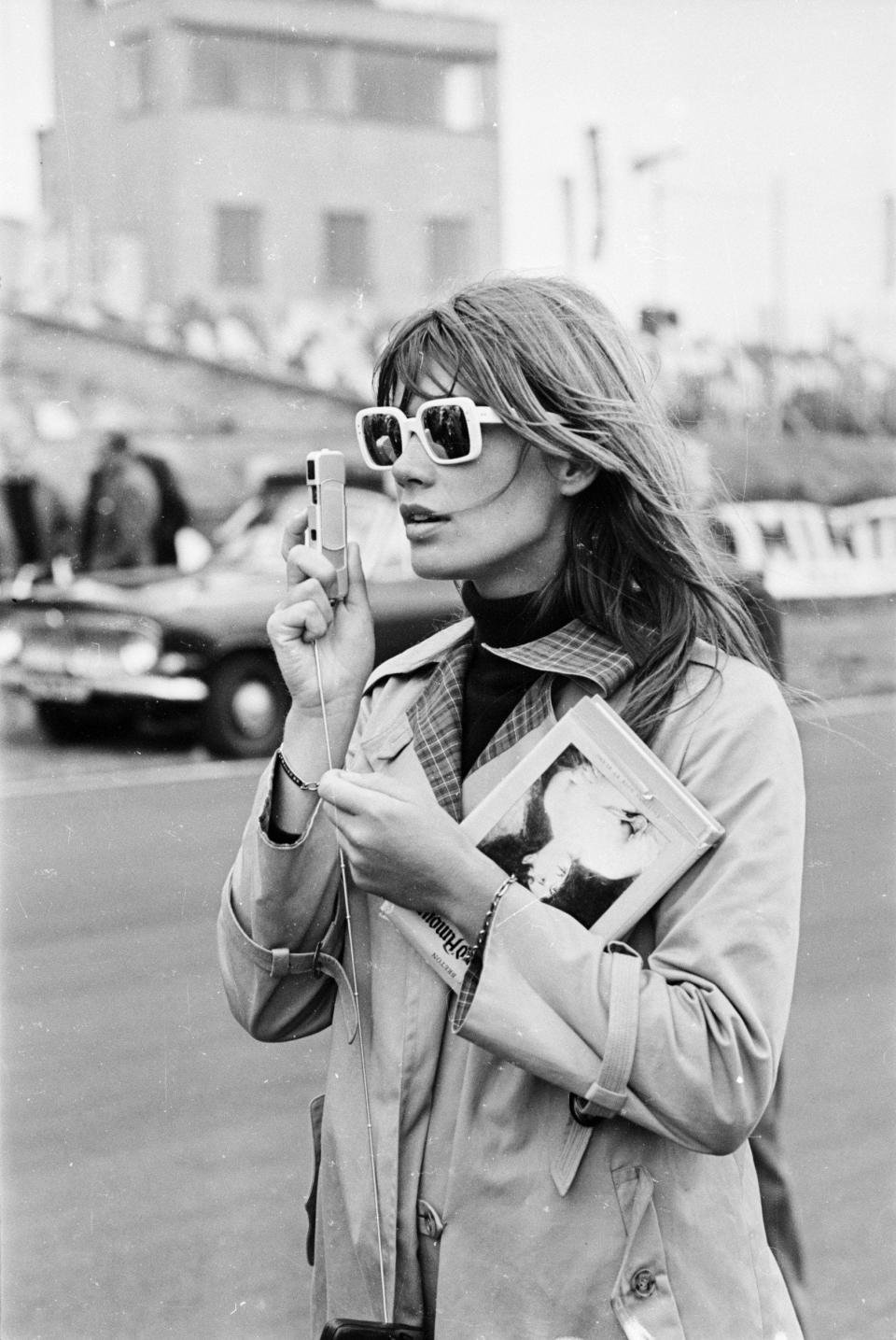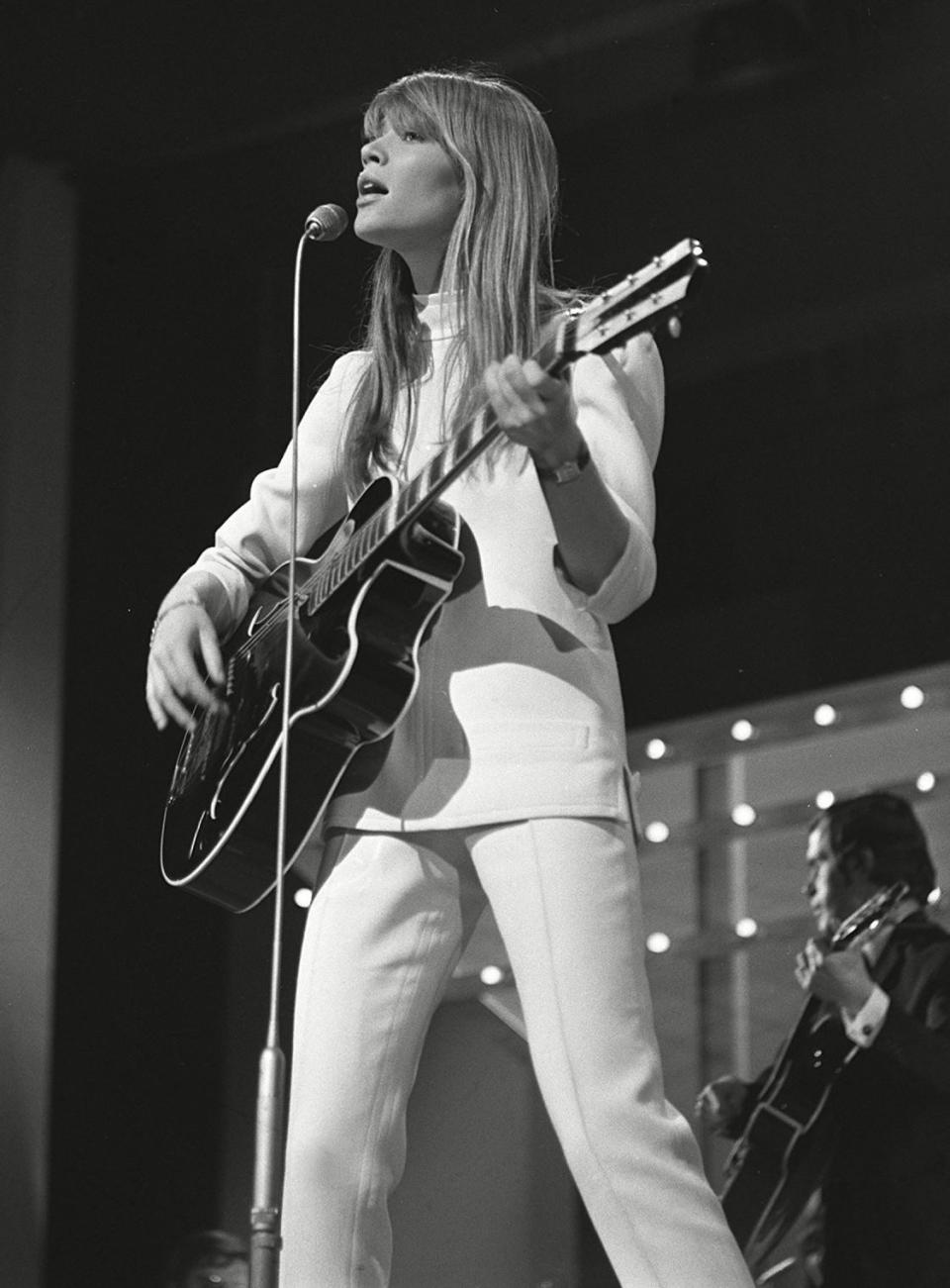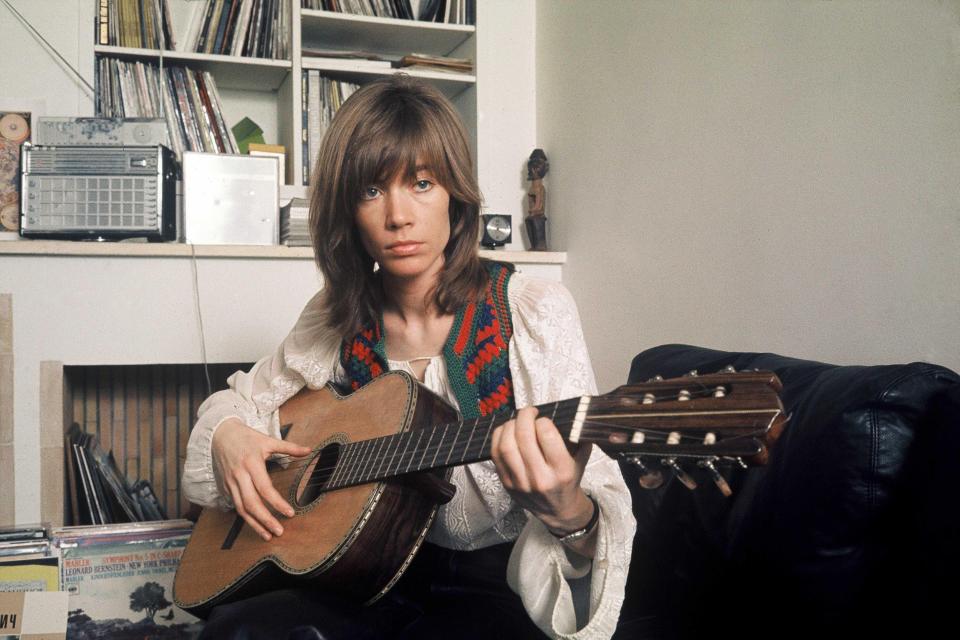Françoise Hardy, who has died aged 80, was an intoxicatingly romantic French singer and heartthrob of the early Beatles era; One of the biggest ‘yé-yé’ stars in her native country, she also enjoyed a modest string of British hits in the mid-1960s, many of them soft and sultry ballads such as Tous les Garçons et les Filles, Et Même and All Over the World, before making a comeback thirty years later with Le Danger (1996), an album that placed her sensual voice and mysterious French lyrics in a contemporary soft rock setting.
She wrote most of her material herself, which was unusual for any pop star, let alone a woman, in the early 1960s. However cheerful her songs were, they often radiated a kind of dreamy sadness. “I walk through the streets, my soul sad,” was a plaintive sentence in Tous les Garçons.
This melancholy contrasted beautifully with the perfectly chosen style, poise and captivating beauty that made her the French cover girl of the 1960s. It was a combination that caused a generation of male adolescents on both sides of the Channel to fall head over heels in love with her – or rather, as the critic Sean O’Hagan suggested in The Observer, “with the idea that they suggested the songs ”.

Among the countless men who idealized her was Salvador Dalí, with whom she ate ortolans, a French delicacy, for the first and only time. David Bowie confessed that he was “passionately in love with her,” Brian Jones of the Rolling Stones tried and failed to seduce her, Mick Jagger described her as his ideal woman, and Bob Dylan honored her with a poem on a record cover .
He doesn’t have to worry. “I had no interest in him as a man, only as an artist,” she told The Daily Telegraph in 2005. “He took me to his hotel room after inviting me to a show in Paris and played me two songs he hadn’t played yet. still released…but he wasn’t very attractive.’
In her early years, Françoise Hardy worked with Serge Gainsbourg; After her renaissance in the 1990s, she duetted with Damon Albarn, Iggy Pop and Julio Iglesias. She also had a fondness for the music of Jesus and Mary Chain and Cigarettes After Sex, the cult Brooklyn band that she said, “I’ve been looking for all my life.”
She had long since given up live performances, feeling that her voice and stage style were not up to it. Her last performances were in 1967, including one at the Savoy Hotel in London, where she wore a metallic dress designed by Paco Rabanne, which, despite its brevity, weighed 16 kg. “If I could have sang like Céline Dion, things would have been different,” she once said, as self-critical as ever.
Françoise Madeleine Hardy was born during an air raid in Nazi-occupied Paris on January 17, 1944, the eldest of two daughters of Madeleine Hardy, an accounting clerk, and her married lover, Étienne Dillard, who was largely absent during his daughter’s childhood .
However, he insisted that Françoise and her sister, Michèle, who was later diagnosed with paranoid schizophrenia, be educated at Institution La Bruyère, a Catholic school run by Trinitarian nuns, where the shame of coming from a single-parent home arose in her an acute lack of confidence that decades of fame and fortune could not dent.
Her first stage was a neighborhood of the ninth arrondissement known as La Trinité, with its own claim to chanson fame. Here was the parental apartment of Lucien Ginsburg, as Serge Gainsbourg was then known, and elsewhere in the neighborhood lived Jean-Philippe Smet (or Johnny Hallyday) and Claude Moine (Eddy Mitchell of the Chaussettes Noires), both of whom Hardy remembered led the local bands of proto-rockers.


In 1959, her father appeared again to offer her a guitar as a reward for completing her baccalaureate degree. Inspired by Salut les Copains, a teen-oriented radio program broadcast on Europe 1 that would become the launching pad for the Beatles-inspired French wave of “yé-yé” pop, she taught herself three chords. She soon used songwriting as a form of therapy, composing a series of relentlessly sad songs.
Signed by Vogue Records in 1961, she recorded Tous les Garçons, her own composition, for “three hours with the worst four musicians in Paris”. Returning from holiday in Austria the following summer, she found that it had become a hit and by mid-1963 sales of Tous les Garçons had reached two million copies, with the French press noting that she had sold more records than Edith in 18 months Piaf. did it in 18 years.
Roger Vadim, the film director who created Brigitte Bardot, took her under his wing and promised to maintain her “girl next door” image, although her long, straight hair was tied back almost immediately, her slacks replaced with a dress and her absence of clothes . makeup corrected. She appeared in Château en Suède (1963), his sex comedy set in a Swedish castle, and a handful of other films, including John Frankenheimer’s sports drama Grand Prix (1966), where Frankenheimer had seen her coming out of a London nightclub, but she has never pursued a serious acting career.
Françoise Hardy represented Monaco at the 1963 Eurovision Song Contest in London, singing L’amour s’en va and coming in joint fifth alongside the French entry. That fall she released her second album, Le Premier Bonheur du Jour. By then she was at the front of the “yé-yé” wave (ostensibly to emulate the “yeah yeah” of British and American rock ‘n’ rollers), but while other yé-yé girls like Sylvie Vartan and Brigitte Bardot traded largely in frivolity, Françoise Hardy’s music retained its characteristic thoughtful, melancholic quality.
Desperate for French recording facilities, she went to work in London, where she gained a British following. Tous les Garçons reached No. 36 in the British charts in 1964 and All Over the World, her plaintive English-language single, reached the Top 20 and stayed in the charts for 15 weeks, becoming possibly her best-known international recording.
Her other albums include Comment te dire adieu (1968), Message staff (1973) and Chiaroscuro (2000), none of which had the same impact on the English-speaking world. Her penultimate album, L’amour fou (2012), whose words are half spoken and half sung, was conceived as the resigned and philosophical soundtrack to a novel of the same name that she published two years later.
During lulls in her musical career, some of which were lengthy, Françoise Hardy found a rewarding diversion in astrology, once devoting four years to the most comprehensive of her several books on the subject. She was a Capricorn, which explained her shyness, she said, because “when the sun is in Capricorn, you are not there… you are below the horizon, you are invisible.”


Her latest album, Personne d’autre, was released in 2018 with 10 original songs, including one in English, You’re My Home. Many of the lyrics are about her growing years, dealing with lymphatic cancer and facing her own mortality. “Time doesn’t speed up anywhere,” she sang on Un seul geste, while both Train spécial and Le large sounded like a lost farewell. Nevertheless, she retained her appearance of sleek and elegant Parisian chic.
Her memoir was translated into several languages, including English, in which it was published as The Despair of Monkeys and Other Trifles (2018), the title coming from the name of a monkey puzzle tree she often visited in the Parc de Bagatelle. The hard, sharp leaves, she said, reminded her of “men who caused me despair.”
Françoise Hardy’s partner in the 1960s was photographer Jean-Marie Périer, whose bland photographs of her, with hair falling over her shoulders and eyes fixed on a point in the distance, adorn her early record covers.
In 1981 she married Jacques Dutronc, her fellow singer and actor with whom she had previously had a son, the jazz guitarist Thomas Dutronc. They lived in a spacious, minimalist split-level apartment close to the Arc de Triomphe, although like her own father, Dutronc was often absent and spent much of his time in their Corsican retreat, and they subsequently formally separated, but are never divorced.
Dutronc and her son survive her.
Françoise Hardy, born January 17, 1944, died June 11, 2024